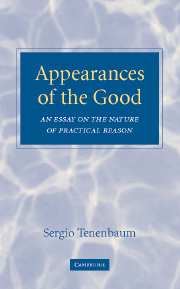Book contents
- Frontmatter
- Contents
- Acknowledgments
- Appearances of the Good
- Introduction
- 1 The Basic Framework: Desires as Appearances
- 2 The Basic Framework: From Desire to Value and Action
- 3 The Subjective Nature of Practical Reason
- 4 The Objective Nature of Practical Reason
- 5 Deontological Goods
- 6 Motivation without Evaluation? Unintelligible Ends, Animal Behavior, and Diabolical Wills
- 7 Evaluation and Motivation Part Company? The Problem of Akrasia
- 8 Evaluation without Motivation? The Problem of Accidie
- Bibliography
- Index
6 - Motivation without Evaluation? Unintelligible Ends, Animal Behavior, and Diabolical Wills
Published online by Cambridge University Press: 25 August 2009
- Frontmatter
- Contents
- Acknowledgments
- Appearances of the Good
- Introduction
- 1 The Basic Framework: Desires as Appearances
- 2 The Basic Framework: From Desire to Value and Action
- 3 The Subjective Nature of Practical Reason
- 4 The Objective Nature of Practical Reason
- 5 Deontological Goods
- 6 Motivation without Evaluation? Unintelligible Ends, Animal Behavior, and Diabolical Wills
- 7 Evaluation and Motivation Part Company? The Problem of Akrasia
- 8 Evaluation without Motivation? The Problem of Accidie
- Bibliography
- Index
Summary
We can think of an apparent continuum of behavior and actions that starts from the most fully deliberated actions of human beings in one extreme and ends at the other extreme at the movement of the “dumb” animals. The scholastic view seems to be at its best in dealing with one end of the spectrum: fully deliberated actions performed by reasonable agents at their most reflective moments. I hope to show, however, that it can also account for a wide range of human behavior that includes merely intentional and merely voluntary actions. However, as we approach the other end of the spectrum, the scholastic view might seem to be in a poor position; in fact, it may seem that it is completely inadequate to explain the actions of the perverse, the odd or mentally ill, children, and other mammals. And one could argue that a view that tries to understand human action in a way that cannot accommodate these instances of human and nonhuman action cannot claim success. After all, the fact that there is such a continuum seems to speak in favor of a unified explanation for the whole spectrum of animal behavior.
The last three chapters try to show how the scholastic view can reach far into this spectrum and, perhaps, to the very end of it. At first, it might seem that the troubles for the scholastic view start much before the end of the spectrum.
- Type
- Chapter
- Information
- Appearances of the GoodAn Essay on the Nature of Practical Reason, pp. 227 - 256Publisher: Cambridge University PressPrint publication year: 2007



